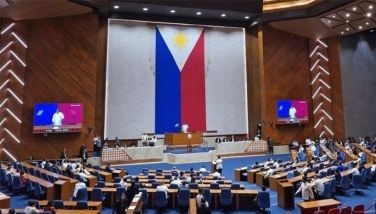‘Schadenfreude’ moments
In a photo posted on Inquirer.net last week, a group of controversial vloggers --some of whom have been accused of propagating disinformation and fiercely defending the “Duterte Diehard Supporters” (DDS) political line-- are seen raising their right hands as they prepare to testify under oath before a House of Representatives hearing on online misinformation and disinformation.
People are used to seeing these vloggers yapping away at whatever propaganda line they’re pushing online. The backdrop this time for the vloggers is the formal setting of a congressional hearing. In fairness, not all pro-Duterte vloggers are propaganda stooges. Some, you sense, are genuinely espousing honest, heartfelt opinions about issues related to Duterte.
But overall, seeing these vloggers in a congressional hearing signifies a long-overdue moment of accountability for online influencers, particularly those accused of spreading fake news and disinformation. There were a couple of them who, under the congressional panel’s intense scrutiny, were led to publicly apologize (one of them in tears) --marking a rare instance where purveyors of online propaganda are being held to journalistic standards of truth and responsibility.
That it has to echo from the halls of Congress is somewhat reassuring. Accountability is finally being demanded, even if it’s only happening now, and even if it’s Congress, not the media or the platforms themselves, forcing it to happen.
It was nevertheless a 'schadenfreude' moment --if I may make such a description-- for many Filipinos who have long demanded justice against disinformation campaigns that have polarized public discourse. Schadenfreude means “pleasure derived from another person's misfortune.”
I agree with UP Economics professor, and vlogger herself, Cielo Magno that it’s time for online influencers who abuse their platforms to face reality: that we have laws on cyber libel as well as on human relations. Magno recently filed a cyber libel complaint against pro-Duterte vlogger Sass Rogando Sasot. She accused Sasot of casting “malicious public imputations that damaged her reputation.”
According to reports, around 20 vloggers accused of spreading fake news online are also being investigated by the National Bureau of Investigation (NBI). The NBI is looking into possible charges of cyber libel and inciting to sedition against these vloggers. Two individuals are already facing arrest warrants, the NBI announced last week.
“Some people take this lightly, saying they have freedom of speech and expression, but those freedoms are not absolute,” NBI Director Jaime Santiago was quoted as saying by The FREEMAN, “when you exceed the boundaries of the law and commit a crime, we have to take action,” he said.
We often think that online abuse is punishable only under criminal laws like cyber libel. But as a free speech libertarian, I have always been wary of invoking criminal libel against “miscreant purveyors of propaganda.” That such a remedy still exists offers some comfort to victims of malicious aspersions.
Still, remedies under the Civil Code also exist. In the exercise of our right to speak, “one must act with justice, give everyone his due, and observe honesty and good faith,” as the Supreme Court has said. Thus, I’m looking more closely at Article 19 of the Civil Code which provides that every person must, in the exercise of their rights and the performance of their duties, act with justice, give everyone their due, and observe honesty and good faith. While this provision does not, by itself, create a cause of action, it lays down a standard of conduct. When someone violates this standard and causes harm, a claim may be made under Article 21, for example, for willful, immoral, or unjust acts that result in injury, even if not illegal.
While there may be no explicit legal duty to speak or publish, when private citizens choose to do so on public platforms, they are effectively performing their duties as netizens or content creators. Maliciously attacking individuals, spreading lies or insinuations that damage reputations, or engaging in intimidation should have real-world consequences. A civil action for damages may be filed against those who engage in such acts against their fellow citizens.
Another way to hold fake news and disinformation purveyors on social media accountable is to verify the persons behind these accounts and trace them to their real-world identities. Some of these false news sharers, shamers, or cyberbullies may be holding sensitive positions in society --teachers, for example. In such cases, they should be held accountable for violating the ethical standards of their profession.
- Latest























